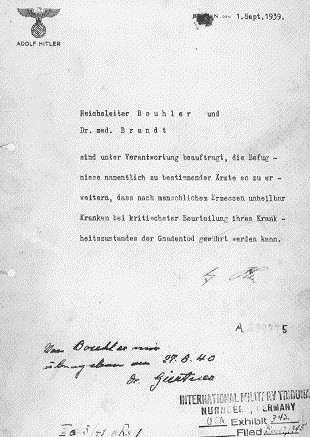Saturday, March 26, 2005
Killing Mercy
From Cardinal Galen's sermon in Münster Cathedral on Sunday, August 3, 1941:
Eventually, the law caught up with Germany at Nuremberg at Hitler's Palace of Justice, but not before the tide of slaughter rose and swept millions away. Eventually, Hitler committed suicide himself and ordered that his own body be burned. We cannot escape the judgement of our own history.

I am reliably informed that lists are also being drawn up in the asylums of the province of Westphalia as well of those patients who are to be taken away as so-called 'unproductive national comrades' and shortly to be killed. The first transport left the Marienthal institution near Münster during this past week.Cardinal Galen cited the laws against murder in his sermon, and said he had brought formal charges to the State Court and the Police President, but had received no response. He said that he had to assume that the poor helpless patients would soon be killed. "Why," he asked?
German men and women, section 211 of the Reich Penal Code is still valid. It states: 'He who deliberately kills another person will be punished by death for murder if the killing is premeditated.'
Those patients who are destined to be killed are transported away from home to a distant asylum presumably in order to protect those who deliberately kill those poor people, members of our families, from this legal punishment. Some illness is then given as the cause of death. Since the corpse has been burnt straight away, the relatives and also the criminal police are unable to establish whether the illness really occurred and what the cause of death was.
No, we are dealing with human beings, our fellow human beings, our brothers and sisters. With poor people, sick people, if you like unproductive people.Go here for some more information at the History Place. Hitler personally directed this program of "mercy deaths":
But have they for that reason forfeited the right to life?
Have you, have I the right to live only so long as we are productive, so long as we are recognized by others as productive?
If you establish and apply the principle that you can kill 'unproductive' fellow human beings then woe betide us all when we become old and frail! If one is allowed to kill the unproductive people then woe betide the invalids who have used up, sacrificed and lost their health and strength in the productive process. If one is allowed forcibly to remove one's unproductive fellow human beings then woe betide loyal soldiers who return to the homeland seriously disabled, as cripples, as invalids. If it is once accepted that people have the right to kill 'unproductive' fellow humans--and even if initially it only affects the poor defenseless mentally ill--then as a matter of principle murder is permitted for all unproductive people, in other words for the incurably sick, the people who have become invalids through labor and war, for us all when we become old, frail and therefore unproductive.
The Nazi euthanasia program quickly expanded to include older disabled children and adults. Hitler's decree of October, 1939, typed on his personal stationery and back dated to Sept. 1, enlarged "the authority of certain physicians to be designated by name in such manner that persons who, according to human judgment, are incurable can, upon a most careful diagnosis of their condition of sickness, be accorded a mercy death."In time, of course, this mercy included deaths by starvation and thirst for these types of people:
Patients had to be reported if they suffered from schizophrenia, epilepsy, senile disorders, therapy resistant paralysis and syphilitic diseases, retardation, encephalitis, Huntington's chorea and other neurological conditions, also those who had been continuously in institutions for at least 5 years, or were criminally insane, or did not posses German citizenship or were not of German or related blood, including Jews, Negroes, and Gypsies.And in due time, at the Nuremberg Trials, these records were duly extracted from the careful Nazi bureaucracy and people were brought before the tribunal and convicted of crimes against humanity. The problem with Nazi Germany was not that the laws against murder were changed - no, the old laws were left in place. The problem was that new laws and directives were put in place, and that people did not see killing "worthless lives" as a crime. The definition of murder did not include such deaths, you see? And if our definition of life support includes food and water brought to someone's mouth, then a tremendous number of people have just been made "terminally ill". And if our definition of "clear and convincing evidence" that someone wishes to die means the decisions of others on their behalf, then we have opened the door to widespread slaughter.
Eventually, the law caught up with Germany at Nuremberg at Hitler's Palace of Justice, but not before the tide of slaughter rose and swept millions away. Eventually, Hitler committed suicide himself and ordered that his own body be burned. We cannot escape the judgement of our own history.

 MaxedOutMama
MaxedOutMama
